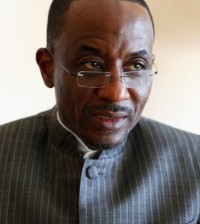CBN retains 12 per cent lending rate, worried about corruption
The Central Bank of Nigeria (CBN) on Tuesday retained its tight monetary stance and left rates unchanged for the umpteenth time.
Both the Monetary Policy Rate (MPR); the Cash Reserve Requirement (CRR) and the Liquidity Ratio were all retained at 12 per cent, 12 per cent and 30 per cent respectively. The MPR is the rate at which the CBN lends money to money deposit banks. This drives the rate at which the banks fix their interest rate to customers; the cash reserve requirement is the minimum capital expected of banks to keep with the apex bank as reserves while the Liquidity Ratio is the minimum amount physical cash banks are expected to have every given time to meet their customers’ demand.
These rates determine to a large extent the amount of funds available to banks and influences lending in the country.
Briefing newsmen at the end of the Monetary Policy Committee (MPC) where the decisions were reached, the apex bank governor, Mallam Sanusi Lamido Sanusi, explained that the need to sustain the gains of monetary policy while utilising the existing space in the corridor to influence yields and exchange rates in the short term informed the MPC to leave the rates unchanged.
He, however, expressed concern over certain risk factors such as increased level of corruption perception and impunity in the country and advised the Federal Government to check the trend as it was capable of decelerating growth in Nigeria.
Sanusi said: “The committee was concerned that the declining contribution of the oil sector to growth, which became apparent in the second half of 2011, continued in Q4 2012. Crude oil production, including condensates and natural gas liquids, decreased by 37,000 barrels per day (bpd) in February 2013 to 2.035m bpd compared with the level of 2.072m bpd attained in December 2012. Oil theft in the Niger Delta remained a source of concern. The committee was also concerned that the decline in the growth rate of agricultural output, which started in the 4th quarter of 2011, continued up to the end of 2012.
“The committee was of the view that although the GDP growth projection remained high, there were a number of risk factors that were likely to affect output performance. These include perception of increased levels of corruption and impunity in the country, insecurity particularly in the northern part of the country, as well as mixed signals from power and petroleum sector reforms.
“The committee was pleased with the prevailing macroeconomic stability despite shocks from both external and domestic environments; a development which informed the tightening stance of monetary policy since the third quarter of 2010.
Having achieved a reasonable degree of moderation in the rate of inflation, there were compelling arguments to consider easing monetary policy, at least from the perspective of stimulating growth in the real sector. Given the slowdown in overall GDP and agricultural GDP growth, inability of the SMEs to borrow at the current lending rates, and crowding out effects that may require monetary easing. The committee carefully weighed the option of relaxing monetary policy against the likely risks in the near-to-medium term.
“It noted that reversing the current stance of monetary policy was not likely to produce a neutral outcome, as it may signal the preference for a higher inflation rate on the part of the CBN.”
According to the CBN governor, the committee also noted the wide spread between deposits and lending rates, which it attributed to the inefficiencies in the market requiring institutional and structural reforms that would enforce behavioural change on the market, consistent with the long term needs of the economy.
( The guardian )







